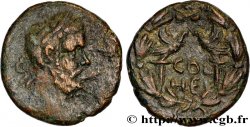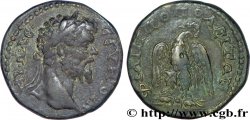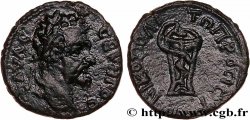bpv_701112 - SEPTIMIUS SEVERUS Sesterce
Not available.
Item sold on our e-shop (2024)
Price : 150.00 €
Item sold on our e-shop (2024)
Price : 150.00 €
Type : Sesterce
Date: c. 198-211
Mint name / Town : Antioche, Pisidie
Metal : copper
Diameter : 34,5 mm
Orientation dies : 12 h.
Weight : 26,68 g.
Rarity : R2
Coments on the condition:
Flan large, centré. Joli revers. Usure régulière. Patine marron
Catalogue references :
Obverse
Obverse legend : IMP CAES L SEP SEV-ERVS PER. AVG.
Obverse description : Tête laurée de Septime Sévère à droite (O*).
Reverse
Reverse legend : COL CAES - ANTIOCH/ S|R.
Reverse description : Mên (Lunus), nu jusqu’à la ceinture debout à droite, coiffé du bonnet phrygien, les épaules ornées d’un croissant, appuyé sur un sceptre, le pied droit posé sur un bucrane, tenant de la main gauche une victoriola et un sceptre de la main droite ; derrière lui, un coq à ses pieds tourné à gauche.
Reverse translation : “Colonia Cæsari Antiocheni/ Senatus Romanus” (la colonie césarienne d’Antioche/ Le Sénat romain).
Commentary
Rubans de type 2. Souvent ces grands bronzes sont présentés comme des médaillons.








 Report a mistake
Report a mistake Print the page
Print the page Share my selection
Share my selection Ask a question
Ask a question Consign / sell
Consign / sell
 Full data
Full data









